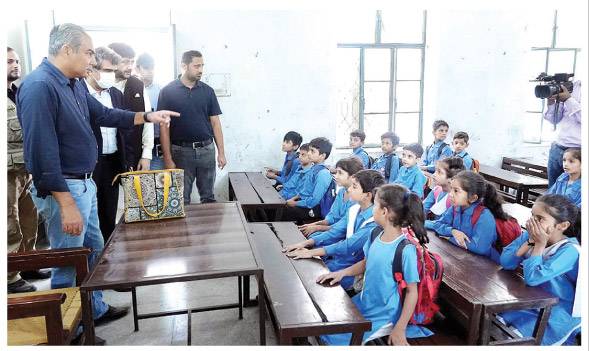LAHORE - In a major development on Wednesday, the Punjab government announced closure of all public and private schools for four days to control the spread of pink eye after health authorities recorded highest number of infections in the province.
“All public and private schools of the province shall remain closed from Thursday 28-09-023 till Sunday
01-10-2023,” says a notification issued by the School Education Department on Wednesday
According to health officials, the highest number of infections in the province was reported in Lahore. A large number of students of schools were complaining of eye infections. There were also reports that school administrations were already allowing students to stay home as soon as they contract the virus and were urging parents to take special care of their children.
Medical experts say pinkeye is spreading rapidly in densely populated cities.
Following the surge in such cases, the Punjab School Education Department issued a notification announcing four-day holidays.
‘PINK EYE OUTBREAK’
Punjab Minister for Primary and Secondary Healthcare Dr Jamal Nasir said on Wednesday that eye surgeons in government hospitals across Punjab were now on standby round the clock to handle pink eye cases while adequate supplies of eye drops had been distributed to ensure swift treatment.
In a press statement, he emphasised the government’s commitment to combating the pink eye outbreak. He urged the citizens to contact the helpline 1033 for treatment and guidance related to pink eye. He reassured the public that Pink eye was not a dangerous disease and poses no threat to vision. He stressed that the government had established special treatment centers at Holy Family Hospital Rawalpindi, Mayo Hospital Lahore, and Nishtar Hospital Multan to provide efficient care to Pink eye patients.
The minister said pink eye was a recurring seasonal phenomenon, especially during the monsoon season, urging affected individuals to take precautions. His advice included regular eye washing, the use of protective glasses, and keeping personal belongings separate from others to prevent the spread of the disease. Punjab’s healthcare system remains committed to addressing the pink eye situation, and citizens were encouraged to reach out to the helpline for any medical concerns related to this condition, he added.
‘Avastin injections scandal’
In a significant development, Dr Jamal Nasir, the Punjab’s Minister of Primary and Secondary Health, revealed that two individuals involved in filling and selling Avastin injections in small syringes were apprehended. This revelation comes as part of an ongoing investigation into the potentially harmful injections. In a statement issued on Wednesday, Dr Nasir disclosed that the initial phase of the inquiry concerning the impact of these injections on patients’ vision is nearing completion. The Primary Health Department has commenced the collection of patients’ records on a dedicated dashboard.
The exact number of affected patients will be determined and announced once the dashboard information is processed. As of now, 68 patients are on record, and this figure may rise by an additional 10 to 15 cases.
Regarding the impact of the injections on patients’ vision, Dr. Nasir explained that the true condition of patients’ eyes will only become clear once the infection is under control. He provided an update on the situation at Mayo Hospital, where 20 patients are being treated. Out of these, 18 have already undergone eye cleaning procedures, and infection treatment is ongoing. In Multan, two out of three patients have received treatment, while the third patient underwent an operation in an attempt to save his eye. Fortunately, there have been no reported cases of patients under treatment affected by Avastin injections in Rawalpindi and Bahawalpur.
In a move to further investigate the quality and safety of Avastin injections, samples have been sent to multiple drug testing laboratories. The results of these laboratory analyses are expected to arrive in 10 to 15 days. Dr. Nasir emphasized that the Drug Testing Laboratory of the Primary Health Department is certified by the World Health Organization. Dr. Nasir made it clear that if the injected samples are found to be substandard or harmful, those responsible for filling small syringes with these injections will be held accountable. Additionally, a notice has been issued to a private hospital in Lahore suspected of engaging in the illegal filling of small syringes with Avastin injections.
This situation is rapidly evolving, and further updates will be provided as the investigation unfolds.






